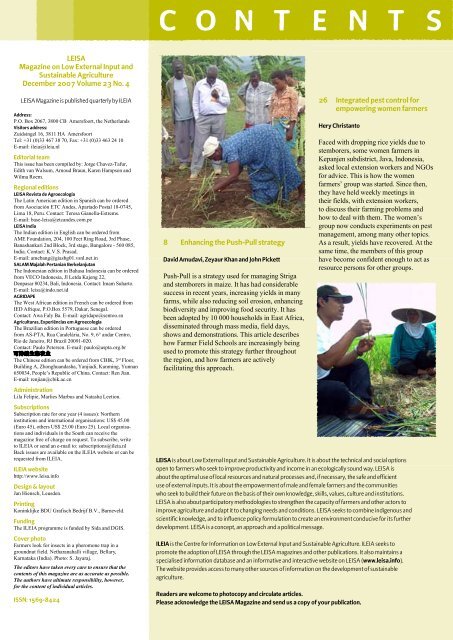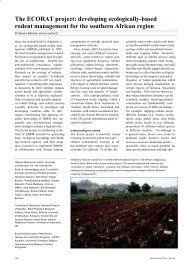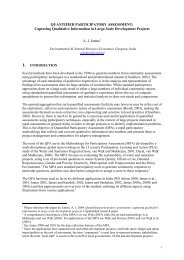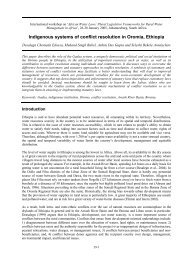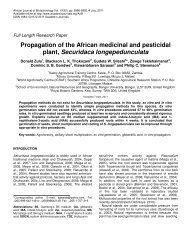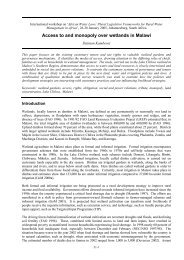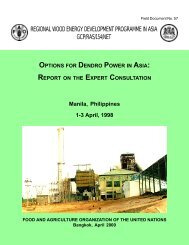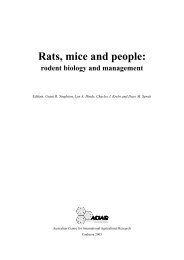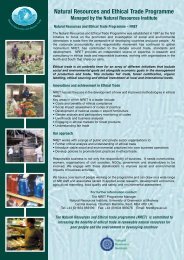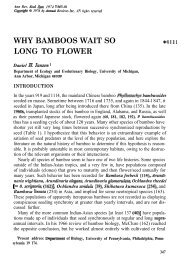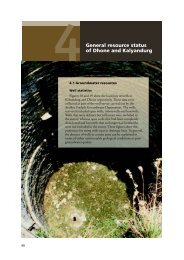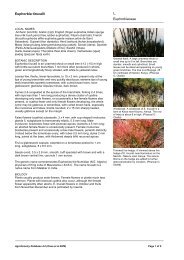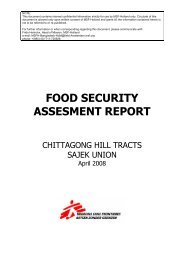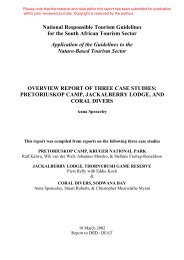Ecological pest management - Natural Resources Institute
Ecological pest management - Natural Resources Institute
Ecological pest management - Natural Resources Institute
Create successful ePaper yourself
Turn your PDF publications into a flip-book with our unique Google optimized e-Paper software.
LEISAMagazine on Low External Input andSustainable AgricultureDecember 2007 Volume 23 No. 4LEISA Magazine is published quarterly by ILEIAAddress:P.O. Box 2067, 3800 CB Amersfoort, the NetherlandsVisitors address:Zuidsingel 16, 3811 HA AmersfoortTel: +31 (0)33 467 38 70, Fax: +31 (0)33 463 24 10E-mail: ileia@ileia.nlEditorial teamThis issue has been compiled by: Jorge Chavez-Tafur,Edith van Walsum, Arnoud Braun, Karen Hampson andWilma Roem.Regional editionsLEISA Revista de AgroecologíaThe Latin American edition in Spanish can be orderedfrom Asociación ETC Andes, Apartado Postal 18-0745,Lima 18, Peru. Contact: Teresa Gianella-Estrems.E-mail: base-leisa@etcandes.com.peLEISA IndiaThe Indian edition in English can be ordered fromAME Foundation, 204, 100 Feet Ring Road, 3rd Phase,Banashankari 2nd Block, 3rd stage, Bangalore - 560 085,India. Contact: K.V.S. Prasad.E-mail: amebang@giasbg01.vsnl.net.inSALAM Majalah Pertanian BerkelanjutanThe Indonesian edition in Bahasa Indonesia can be orderedfrom Veco Indonesia, Jl Letda Kajeng 22,Denpasar 80234, Bali, Indonesia. Contact: Imam Suharto.E-mail: leisa@indo.net.idAgridapeThe West African edition in French can be ordered fromIED Afrique, P.O.Box 5579, Dakar, Senegal.Contact: Awa Faly Ba. E-mail: agridape@sentoo.snAgriculturas, Experiências em AgroecologiaThe Brazilian edition in Portuguese can be orderedfrom AS-PTA, Rua Candelária, No. 9, 6° andar Centro,Rio de Janeiro, RJ Brazil 20091-020.Contact: Paulo Petersen. E-mail: paulo@aspta.org.brThe Chinese edition can be ordered from CBIK, 3 rd Floor,Building A, Zhonghuandasha, Yanjiadi, Kunming, Yunnan650034, People’s Republic of China. Contact: Ren Jian.E-mail: renjian@cbik.ac.cnAdministrationLila Felipie, Marlies Marbus and Natasha Leetion.SubscriptionsSubscription rate for one year (4 issues): Northerninstitutions and international organisations: US$ 45.00(Euro 45), others US$ 25.00 (Euro 25). Local organisationsand individuals in the South can receive themagazine free of charge on request. To subscribe, writeto ILEIA or send an e-mail to: subscriptions@ileia.nlBack issues are available on the ILEIA website or can berequested from ILEIA.ILEIA websitehttp://www.leisa.infoDesign & layoutJan Hiensch, Leusden.PrintingKoninklijke BDU Grafisch Bedrijf B.V., Barneveld.FundingThe ILEIA programme is funded by Sida and DGIS.Cover photoFarmers look for insects in a pheromone trap in agroundnut field. Netharanahalli village, Bellary,Karnataka (India). Photo: S. Jayaraj.The editors have taken every care to ensure that thecontents of this magazine are as accurate as possible.The authors have ultimate responsibility, however,for the content of individual articles.ISSN: 1569-84248 Enhancing the Push-Pull strategyDavid Amudavi, Zeyaur Khan and John PickettPush-Pull is a strategy used for managing Strigaand stemborers in maize. It has had considerablesuccess in recent years, increasing yields in manyfarms, while also reducing soil erosion, enhancingbiodiversity and improving food security. It hasbeen adopted by 10 000 households in East Africa,disseminated through mass media, field days,shows and demonstrations. This article describeshow Farmer Field Schools are increasingly beingused to promote this strategy further throughoutthe region, and how farmers are activelyfacilitating this approach.26 Integrated <strong>pest</strong> control forempowering women farmersHery ChristantoFaced with dropping rice yields due tostemborers, some women farmers inKepanjen subdistrict, Java, Indonesia,asked local extension workers and NGOsfor advice. This is how the womenfarmers’ group was started. Since then,they have held weekly meetings intheir fields, with extension workers,to discuss their farming problems andhow to deal with them. The women’sgroup now conducts experiments on <strong>pest</strong><strong>management</strong>, among many other topics.As a result, yields have recovered. At thesame time, the members of this grouphave become confident enough to act asresource persons for other groups.LEISA is about Low External Input and Sustainable Agriculture. It is about the technical and social optionsopen to farmers who seek to improve productivity and income in an ecologically sound way. LEISA isabout the optimal use of local resources and natural processes and, if necessary, the safe and efficientuse of external inputs. It is about the empowerment of male and female farmers and the communitieswho seek to build their future on the basis of their own knowledge, skills, values, culture and institutions.LEISA is also about participatory methodologies to strengthen the capacity of farmers and other actors toimprove agriculture and adapt it to changing needs and conditions. LEISA seeks to combine indigenous andscientific knowledge, and to influence policy formulation to create an environment conducive for its furtherdevelopment. LEISA is a concept, an approach and a political message.ILEIA is the Centre for Information on Low External Input and Sustainable Agriculture. ILEIA seeks topromote the adoption of LEISA through the LEISA magazines and other publications. It also maintains aspecialised information database and an informative and interactive website on LEISA (www.leisa.info).The website provides access to many other sources of information on the development of sustainableagriculture.Readers are welcome to photocopy and circulate articles.Please acknowledge the LEISA Magazine and send us a copy of your publication.


